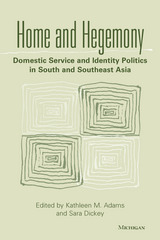2 books by Dickey, Sara

Home and Hegemony
Domestic Service and Identity Politics in South and Southeast Asia
Kathleen M. Adams and Sara Dickey, Editors
University of Michigan Press, 2000
In the intimate context of domestic service, power relations take on one of their most personalized forms. Domestic servants and their employers must formulate their political identities in relationship to each other, sometimes reinforcing and sometimes challenging broader social hierarchies such as those based on class, caste or rank, gender, race and ethnicity, nationality, sexual orientation, and kinship relations.
This pathbreaking collection builds on recent examinations of identity in the postcolonial states of South and Southeast Asia by investigating the ways in which domestic workers and their employers come to know and depict one another and themselves through their interactions inside and outside of the home. This setting provides a particularly apt arena for examining the daily negotiations of power and hegemony.
Contributors to the volume, all anthropologists, provide rich ethnographic analyses that avoid a narrow focus on either workers or employers. Rather, they examine systems of power through specific topics that range from the notion of "nurture for sale" to the roles of morality and humor in the negotiation of hierarchy and the dilemmas faced by foreign employers who find themselves in life-and-death dependence on their servants.
With its provocative theoretical and ethnographic contributions to current debates, this collection will be of interest to scholars in Asian studies, women's studies, anthropology, sociology, and cultural studies.
Kathleen M. Adams is Associate Professor of Anthropology, Loyola University of Chicago. Sara Dickey is Associate Professor of Anthropology, Bowdoin College.
This pathbreaking collection builds on recent examinations of identity in the postcolonial states of South and Southeast Asia by investigating the ways in which domestic workers and their employers come to know and depict one another and themselves through their interactions inside and outside of the home. This setting provides a particularly apt arena for examining the daily negotiations of power and hegemony.
Contributors to the volume, all anthropologists, provide rich ethnographic analyses that avoid a narrow focus on either workers or employers. Rather, they examine systems of power through specific topics that range from the notion of "nurture for sale" to the roles of morality and humor in the negotiation of hierarchy and the dilemmas faced by foreign employers who find themselves in life-and-death dependence on their servants.
With its provocative theoretical and ethnographic contributions to current debates, this collection will be of interest to scholars in Asian studies, women's studies, anthropology, sociology, and cultural studies.
Kathleen M. Adams is Associate Professor of Anthropology, Loyola University of Chicago. Sara Dickey is Associate Professor of Anthropology, Bowdoin College.
[more]

Living Class in Urban India
Dickey, Sara
Rutgers University Press, 2016
Honorable mention, 2018 Ananda Kentish Coomaraswamy Book Prize from the South Asia Council of the Association for Asian Studies
Many Americans still envision India as rigidly caste-bound, locked in traditions that inhibit social mobility. In reality, class mobility has long been an ideal, and today globalization is radically transforming how India’s citizens perceive class. Living Class in Urban India examines a nation in flux, bombarded with media images of middle-class consumers, while navigating the currents of late capitalism and the surges of inequality they can produce.
Many Americans still envision India as rigidly caste-bound, locked in traditions that inhibit social mobility. In reality, class mobility has long been an ideal, and today globalization is radically transforming how India’s citizens perceive class. Living Class in Urban India examines a nation in flux, bombarded with media images of middle-class consumers, while navigating the currents of late capitalism and the surges of inequality they can produce.
Anthropologist Sara Dickey puts a human face on the issue of class in India, introducing four people who live in the “second-tier” city of Madurai: an auto-rickshaw driver, a graphic designer, a teacher of high-status English, and a domestic worker. Drawing from over thirty years of fieldwork, she considers how class is determined by both subjective perceptions and objective conditions, documenting Madurai residents’ palpable day-to-day experiences of class while also tracking their long-term impacts. By analyzing the intertwined symbolic and economic importance of phenomena like wedding ceremonies, religious practices, philanthropy, and loan arrangements, Dickey’s study reveals the material consequences of local class identities. Simultaneously, this gracefully written book highlights the poignant drive for dignity in the face of moralizing class stereotypes.
Through extensive interviews, Dickey scrutinizes the idioms and commonplaces used by residents to justify class inequality and, occasionally, to subvert it. Along the way, Living Class in Urban India reveals the myriad ways that class status is interpreted and performed, embedded in everything from cell phone usage to religious worship.
[more]
READERS
Browse our collection.
PUBLISHERS
See BiblioVault's publisher services.
STUDENT SERVICES
Files for college accessibility offices.
UChicago Accessibility Resources
home | accessibility | search | about | contact us
BiblioVault ® 2001 - 2024
The University of Chicago Press









